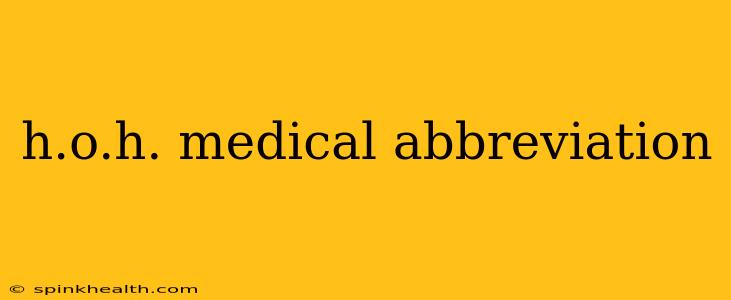Have you ever encountered the medical abbreviation "HOH" and wondered what it means? This seemingly simple acronym holds significant weight in the medical field, representing a common condition affecting millions worldwide. Let's delve into the meaning of HOH and explore related aspects that often accompany this abbreviation.
What Does HOH Stand For in Medical Terms?
HOH stands for Hearing Impaired or Hard of Hearing. It's a medical term used to describe individuals who experience some degree of hearing loss but aren't entirely deaf. The level of hearing loss can vary significantly, ranging from mild to severe. This broad spectrum makes it crucial to understand the nuances of this condition.
What Are the Different Degrees of Hearing Loss?
Understanding the severity of hearing loss is key to comprehending the implications of an HOH diagnosis. The extent of the hearing loss directly influences the individual's daily life and the support they may need. This is often categorized into different levels:
- Mild Hearing Loss: Individuals with mild hearing loss might struggle to hear soft sounds or conversations in noisy environments. They often don't require significant assistive devices.
- Moderate Hearing Loss: People with moderate hearing loss have more difficulty understanding speech, especially in noisy environments or when the speaker is far away. Hearing aids often become beneficial at this stage.
- Severe Hearing Loss: In severe hearing loss, understanding speech is challenging even in quiet settings. Hearing aids are usually necessary, and other assistive technologies may also be required.
- Profound Hearing Loss: This represents the most significant degree of hearing loss, often requiring the use of cochlear implants for effective communication.
How is Hearing Loss Diagnosed?
A comprehensive hearing evaluation is crucial for determining the level and type of hearing loss. This typically involves various tests, including:
- Pure-tone audiometry: This test measures how well you hear different pitches (frequencies) at various volumes.
- Speech audiometry: This assessment measures how well you understand speech at different volumes and in various listening conditions.
- Tympanometry: This test examines the function of your middle ear.
What Causes Hearing Impairment (HOH)?
The causes of hearing impairment are diverse and can be broadly categorized as:
- Age-related hearing loss (Presbycusis): This is the most common cause of hearing loss, affecting a substantial portion of the population as they age.
- Noise-induced hearing loss: Prolonged exposure to loud noises, whether from occupational settings or recreational activities, can damage the delicate hair cells in the inner ear.
- Genetic factors: Some individuals inherit a predisposition to hearing loss from their family members.
- Infections: Certain infections, particularly during pregnancy or early childhood, can result in hearing loss.
- Ototoxic medications: Some medications can damage the hearing, causing temporary or permanent hearing loss.
- Head injuries: Traumatic brain injuries can also lead to hearing problems.
What are the Treatments and Management Options for HOH?
The management of hearing impairment depends largely on the severity and underlying cause of the condition. Common approaches include:
- Hearing aids: These devices amplify sounds to improve hearing, available in various styles and technologies.
- Cochlear implants: These are surgically implanted devices that bypass damaged parts of the ear to directly stimulate the auditory nerve.
- Assistive listening devices: These devices, such as amplified telephones or alerting systems, enhance communication in specific situations.
- Speech therapy: Speech therapy can assist individuals in improving their communication skills and adjusting to hearing loss.
- Hearing rehabilitation programs: These programs offer a holistic approach, encompassing education, counseling, and support for individuals with hearing loss.
Can Hearing Loss Be Prevented?
While some causes of hearing loss are unavoidable, taking preventive measures can significantly reduce your risk:
- Protect your ears from loud noises: Use hearing protection in noisy environments.
- Get regular hearing check-ups: Early detection and intervention are crucial for managing hearing loss effectively.
- Manage underlying health conditions: Control conditions that contribute to hearing loss, such as high blood pressure and diabetes.
Understanding HOH and its implications is crucial for individuals, families, and healthcare professionals. Early detection and appropriate management can significantly enhance the quality of life for those affected by hearing impairment. Remember, access to information and resources is key to navigating this condition effectively.

